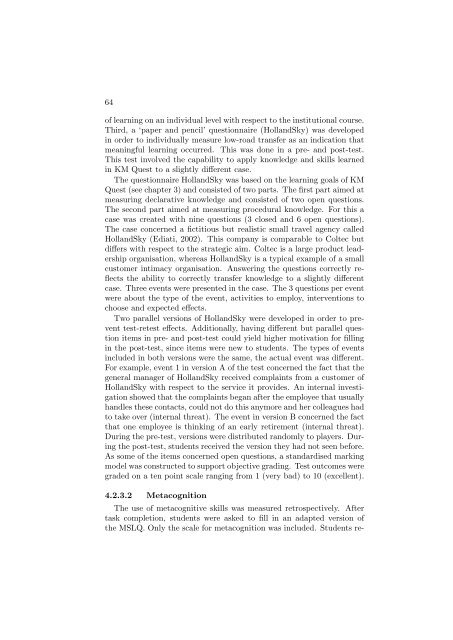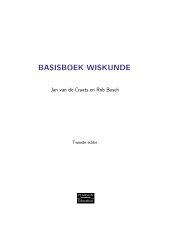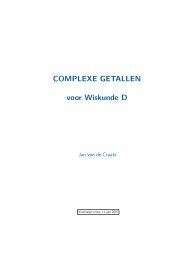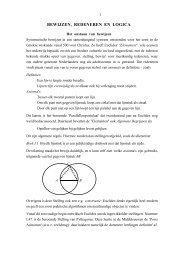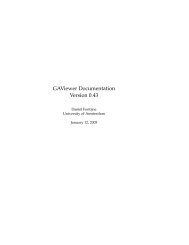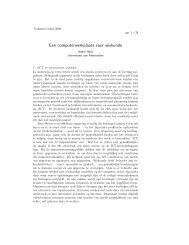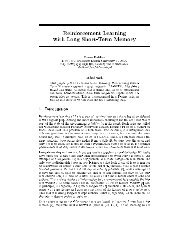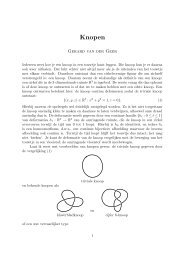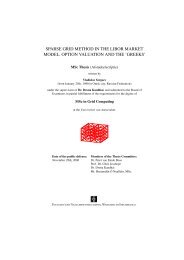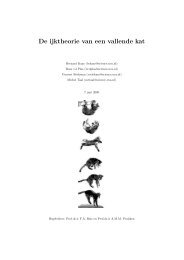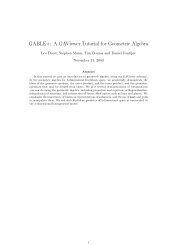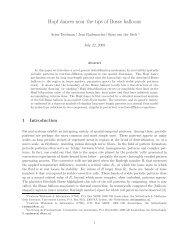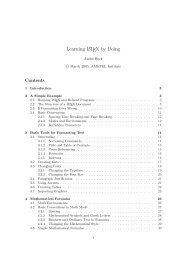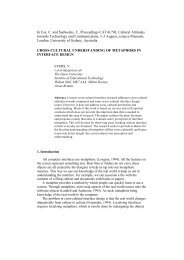The role of metacognitive skills in learning to solve problems
The role of metacognitive skills in learning to solve problems
The role of metacognitive skills in learning to solve problems
Create successful ePaper yourself
Turn your PDF publications into a flip-book with our unique Google optimized e-Paper software.
64<br />
<strong>of</strong> learn<strong>in</strong>g on an <strong>in</strong>dividual level with respect <strong>to</strong> the <strong>in</strong>stitutional course.<br />
Third, a ‘paper and pencil’ questionnaire (HollandSky) was developed<br />
<strong>in</strong> order <strong>to</strong> <strong>in</strong>dividually measure low-road transfer as an <strong>in</strong>dication that<br />
mean<strong>in</strong>gful learn<strong>in</strong>g occurred. This was done <strong>in</strong> a pre- and post-test.<br />
This test <strong>in</strong>volved the capability <strong>to</strong> apply knowledge and <strong>skills</strong> learned<br />
<strong>in</strong> KM Quest <strong>to</strong> a slightly different case.<br />
<strong>The</strong> questionnaire HollandSky was based on the learn<strong>in</strong>g goals <strong>of</strong> KM<br />
Quest (see chapter 3) and consisted <strong>of</strong> two parts. <strong>The</strong> first part aimed at<br />
measur<strong>in</strong>g declarative knowledge and consisted <strong>of</strong> two open questions.<br />
<strong>The</strong> second part aimed at measur<strong>in</strong>g procedural knowledge. For this a<br />
case was created with n<strong>in</strong>e questions (3 closed and 6 open questions).<br />
<strong>The</strong> case concerned a fictitious but realistic small travel agency called<br />
HollandSky (Ediati, 2002). This company is comparable <strong>to</strong> Coltec but<br />
differs with respect <strong>to</strong> the strategic aim. Coltec is a large product leadership<br />
organisation, whereas HollandSky is a typical example <strong>of</strong> a small<br />
cus<strong>to</strong>mer <strong>in</strong>timacy organisation. Answer<strong>in</strong>g the questions correctly reflects<br />
the ability <strong>to</strong> correctly transfer knowledge <strong>to</strong> a slightly different<br />
case. Three events were presented <strong>in</strong> the case. <strong>The</strong> 3 questions per event<br />
were about the type <strong>of</strong> the event, activities <strong>to</strong> employ, <strong>in</strong>terventions <strong>to</strong><br />
choose and expected effects.<br />
Two parallel versions <strong>of</strong> HollandSky were developed <strong>in</strong> order <strong>to</strong> prevent<br />
test-retest effects. Additionally, hav<strong>in</strong>g different but parallel question<br />
items <strong>in</strong> pre- and post-test could yield higher motivation for fill<strong>in</strong>g<br />
<strong>in</strong> the post-test, s<strong>in</strong>ce items were new <strong>to</strong> students. <strong>The</strong> types <strong>of</strong> events<br />
<strong>in</strong>cluded <strong>in</strong> both versions were the same, the actual event was different.<br />
For example, event 1 <strong>in</strong> version A <strong>of</strong> the test concerned the fact that the<br />
general manager <strong>of</strong> HollandSky received compla<strong>in</strong>ts from a cus<strong>to</strong>mer <strong>of</strong><br />
HollandSky with respect <strong>to</strong> the service it provides. An <strong>in</strong>ternal <strong>in</strong>vestigation<br />
showed that the compla<strong>in</strong>ts began after the employee that usually<br />
handles these contacts, could not do this anymore and her colleagues had<br />
<strong>to</strong> take over (<strong>in</strong>ternal threat). <strong>The</strong> event <strong>in</strong> version B concerned the fact<br />
that one employee is th<strong>in</strong>k<strong>in</strong>g <strong>of</strong> an early retirement (<strong>in</strong>ternal threat).<br />
Dur<strong>in</strong>g the pre-test, versions were distributed randomly <strong>to</strong> players. Dur<strong>in</strong>g<br />
the post-test, students received the version they had not seen before.<br />
As some <strong>of</strong> the items concerned open questions, a standardised mark<strong>in</strong>g<br />
model was constructed <strong>to</strong> support objective grad<strong>in</strong>g. Test outcomes were<br />
graded on a ten po<strong>in</strong>t scale rang<strong>in</strong>g from 1 (very bad) <strong>to</strong> 10 (excellent).<br />
4.2.3.2 Metacognition<br />
<strong>The</strong> use <strong>of</strong> <strong>metacognitive</strong> <strong>skills</strong> was measured retrospectively. After<br />
task completion, students were asked <strong>to</strong> fill <strong>in</strong> an adapted version <strong>of</strong><br />
the MSLQ. Only the scale for metacognition was <strong>in</strong>cluded. Students re-


